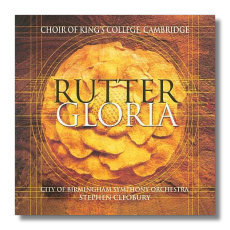
The Internet's Premier Classical Music Source
Related Links
- Rutter Reviews
- Latest Reviews
- More Reviews
-
By Composer
-
Collections
DVD & Blu-ray
Books
Concert Reviews
Articles/Interviews
Software
Audio
Search Amazon
Recommended Links
Site News
 CD Review
CD Review
John Rutter

Choral Music
- Gloria
- Magnificat *
- Psalm 150
Gonville and Caius College Choir
* Choir of King's College, Cambridge
City of Birmingham Symphony Orchestra/Stephen Cleobury
EMI 557952-2 DDD 61:09
If I may be forgiven the comparison, John Rutter is the Andrea Bocelli of classical choral music: many people adore his work, and there are (probably not so) many who loathe it. Is he the most shining example of the English choral tradition at work today, or has he merely lulled millions of people to sleep with too-sugary choral confections? As is often the case in matters such as these, the truth probably lies somewhere in between these two extremes. Having been an amateur chorister for many years, I've had the opportunity to experience many of Rutter's arrangements and original works first-hand. His understanding of what makes a choir sound good is beyond question. As a well-traveled choral conductor himself, his technical abilities as a composer of choral music know few equals today.
What usually troubles Rutter's skeptics is the notion that his music is almost too approachable. In his booklet notes to Psalm 150, Rutter admits to "echoing the sounds that [Sir William] Walton made at the coronation of 1953." In truth, Walton, who was not adverse to letting hints of popular music creep into his compositions, seems like a Puritan next to Rutter, who owes as much of a debt to Andrew Lloyd Webber (Requiem) and Leonard Bernstein (West Side Story, Mass, Chichester Psalms) as he does to Walton and Elgar. The Gloria presented here is one of his most popular works, and the 37-minute Magnificat one of his most substantial. Rutter's settings of them are splendid in every sense of the word, but one can't help feeling that Rutter could go deeper if he were less concerned with giving pleasure (to listeners and performers), and more concerned with probing for the truth, the essence of these texts. I doubt my opinion will change many minds, though.
Rutter recorded his Gloria and Magnificat – I am not sure about Psalm 150 – with the Cambridge Singers. The more mature tone of that ensemble balances the sentimentality of the material. In contrast, having the boys of King's College Choir sing Rutter is like using two lumps of sugar when one will do. I know that many, many listeners will enjoy this CD, and who am I to tell them that they are wrong in doing so? I will say, however, that the best way to appreciate this music is with no additional sweeteners. It must also be said that the men and boys of King's sing with all the polish and beauty one expects from them. Firmer, more musically assertive leadership from Stephen Cleobury would not have been unwelcome, however.
Recorded in King's College Chapel, the sound on this CD is predictably live, although the engineering team has handled the potential pitfalls well. The booklet contains an essay by the composer himself, and all of the sung texts.
Copyright © 2005, Raymond Tuttle




















